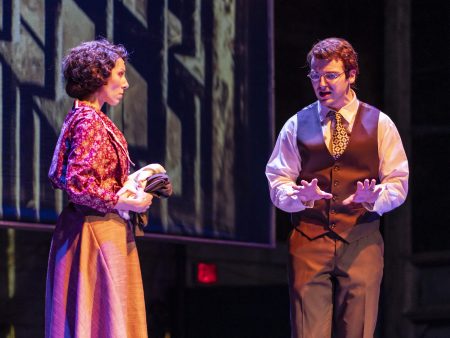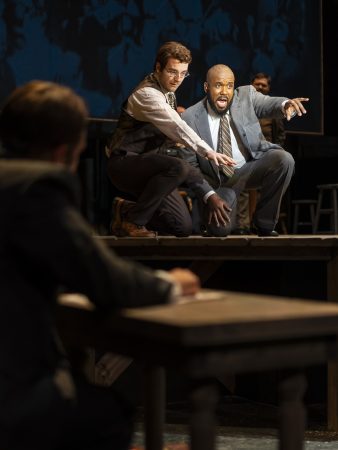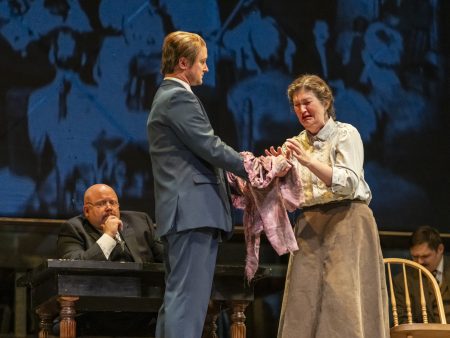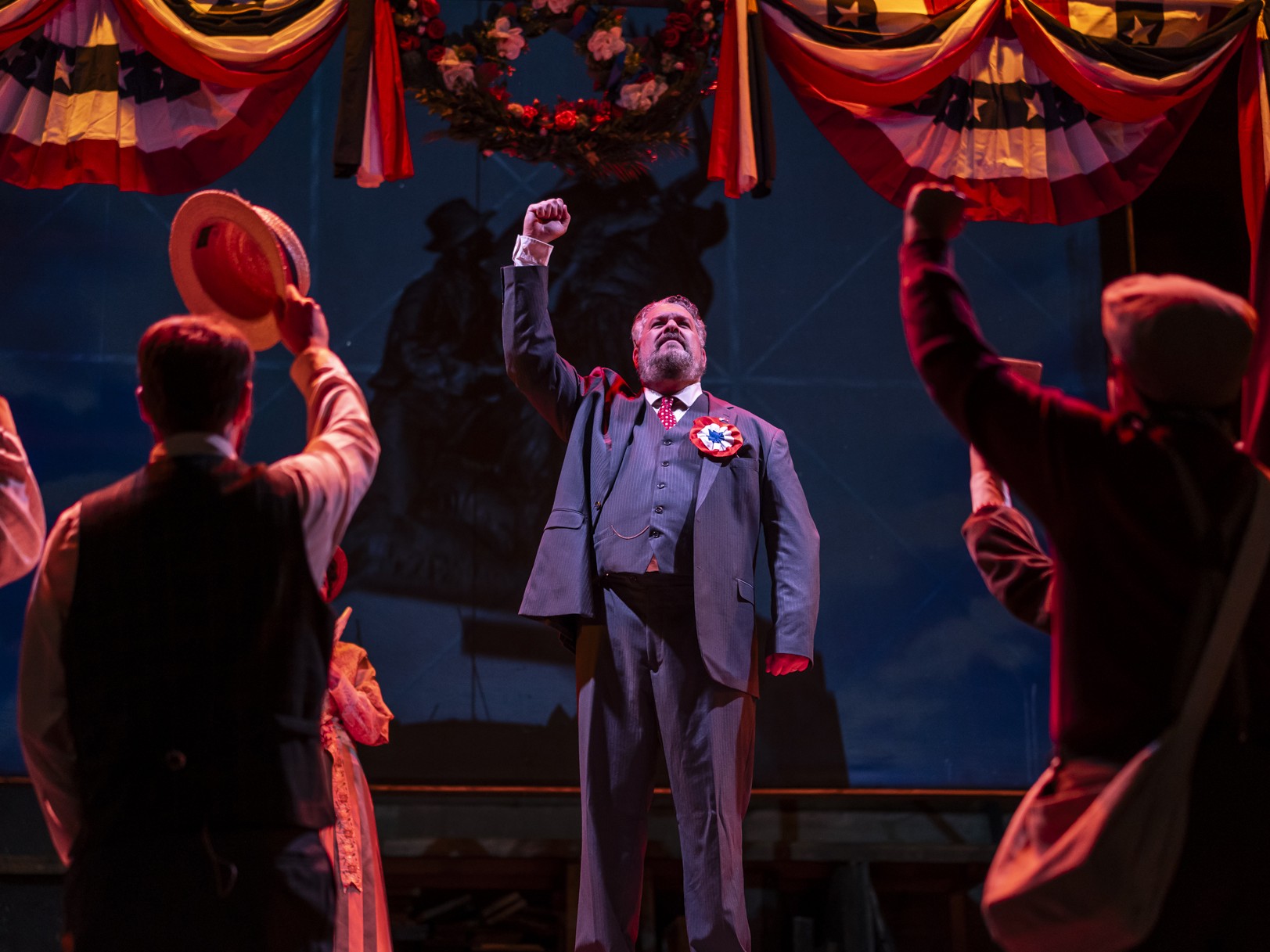Photo: Jared Hoffert as Gov. John Slaton with cast in scene from Parade. Photo by Ashlee Sayles
By Steven Sheldon & Sylvia Egerton
Warning: This review contains a reference to sexual assault.
The creative, artistic team of The Croswell Opera House, led by Jere Righter, deserves all the credit for adding the Alfred Uhry/Jason Robert Brown musical “Parade” to their 2025 season. What they couldn’t anticipate was under the direction of UM’s musical theatre performance grad Michael Yeun, Parade would achieve artistic perfection.
From start to finish, everything about Yeun’s Parade was perfect. Tony Award nominee set and projection designer, Tobin Ost, stripped the Croswell stage bare, allowing the audience a peek behind the curtain, with a basic set design and little furniture. Yeun’s vision was “to not clutter the stage with stuff but rather, through the actors, let the story tell itself.” And, what a story they told.
Orchestra conductor Todd Schreiber led a flawless performance of the singers and musicians. Lighting cues were perfect. The projection screen behind the set added so much to the drama. Stage direction – check. Tech cues – perfect.

Yeun was successful in maintaining the creative tension throughout. The tension was palpable. The actors exuded tension. Yuen’s direction was dramatic. There were moments where actors would finish singing and the audience sat in stunned silence, not knowing whether to applaud. Yeun said after the show that the silence “were a sign that the actors and audience were connected emotionally.”
Parade opened on Broadway to a short run in December 1998. The story details the 1913 rape and murder of 13-year-old Mary Phagan in Atlanta, Georgia. The horror of the crime demanded that someone, anyone, pay. And quickly. Parade demonstrates how one woman’s grief (Mary Phagan’s mother, played so effectively by Maria Portaro-Mohler), inflamed a town’s emotions and unleashed a mob mentality, fueled by hate, racism and antisemitism.

Amidst the grief and anger, there were those who sought to benefit from the chaos. Hugh Dorsey, a corrupt prosecutor, played by Steven Kiss; An antisemitic newspaper publisher, Tom Watson, played by Joshua Egnatuk; Britt Craig, a newspaper reporter who senses a career-making story; and Frankie Epps, the young man wooing Mary Phagan, who, in his heart, is true to the Confederate flag.
The townspeople are angry and grief stricken, trying to make sense of the brutal murder, singing “There Is A Fountain” and “It Don’t Make Sense.” Craig, sensing an opportunity to make a name for himself, writes sensational stories while singing “Big News.” Local law enforcement, Detective Starnes (Hobbes Treynor) and Officer Ivey (Walter Book), take their direction from the corrupt prosecutor and focus exclusively on two “suspects,” a Black man and a Jew.
Jim Conley, a Black man (played by Nickolas Brown), works as a janitor and is interrogated relentlessly. While under intense pressure, he implicates Leo Frank (played brilliantly by Matthew Porter), who has always been uncomfortable being a northern Jew in the south.

Then Parade becomes two stories. The town’s thirst for blood and the incredible love story between Frank and his wife, Lucille, played by Kristin Kukic. Kukic becomes the real star of the show. Her singing voice is angelic. Even as she questions her marriage, singing “What Am I Waiting For,” she is a devoted, loving wife. Her emotional turmoil is on full display as Act I ends with the jury yelling “GUILTY!” as the town erupts in celebration.
Though the house lights came on, the audience again sat in stunned silence, as Porter walked aimlessly in his jail cell during the intermission.
In Act II, Lucille Frank becomes unrelenting in her pursuit of justice for her husband. Governor Slaton (Jared Hoffert) is hosting a party, singing and dancing to “Pretty Music.” He is confronted by Kukic, begging him to intercede on behalf of her husband. Slaton asserts that Frank was convicted by a jury of his peers. While exiting, Mrs. Frank tells him, “You’re either a jackass or a coward.”
In a quiet moment with his wife, Governor Slaton tells her, “You’re married to a jackassl.” Sally Salton, portrayed so wonderfully by Julia Spanja Hoffert (who is really married to her stage husband), replies, “And that’s news?” The Governor concedes that he needs to do something with the Frank case, but knows that it would cost him his political future. Mrs. Slaton replies, “Being the wife of an ex-governor who was a jackass is better than being the first lady to a coward.” And with that line, the audience broke their silence with a loud, sustained applause.
Porter and Kukic bring the Frank’s love story into full view in Act II. The couple climb toward their emotional apex singing “This Is Not Over Yet.” Their words are hopeful. Their voices are strong and pure. And the song envelopes the entire audience.
The pair deliver a stunning version of the song “All The Wasted Time,” the emotional highlight of the show. The couple are finally able to appreciate what their love has meant and express those feelings to each other, openly and with love. It provides the audience with something pleasurable to hang onto. Something hopeful.
But that something pleasurable, something hopeful, is short-lived. Sometimes reality intrudes on the happy ending everyone is wishing for.
And that is the real story of Parade. And director Yeun ends this show in the only way it should end. You will need to see it to understand.
Parade runs through Sunday, September 21st. Tickets can be purchased online at croswell.org or by calling (517) 264-7649.





 8123 Main St Suite 200 Dexter, MI 48130
8123 Main St Suite 200 Dexter, MI 48130

